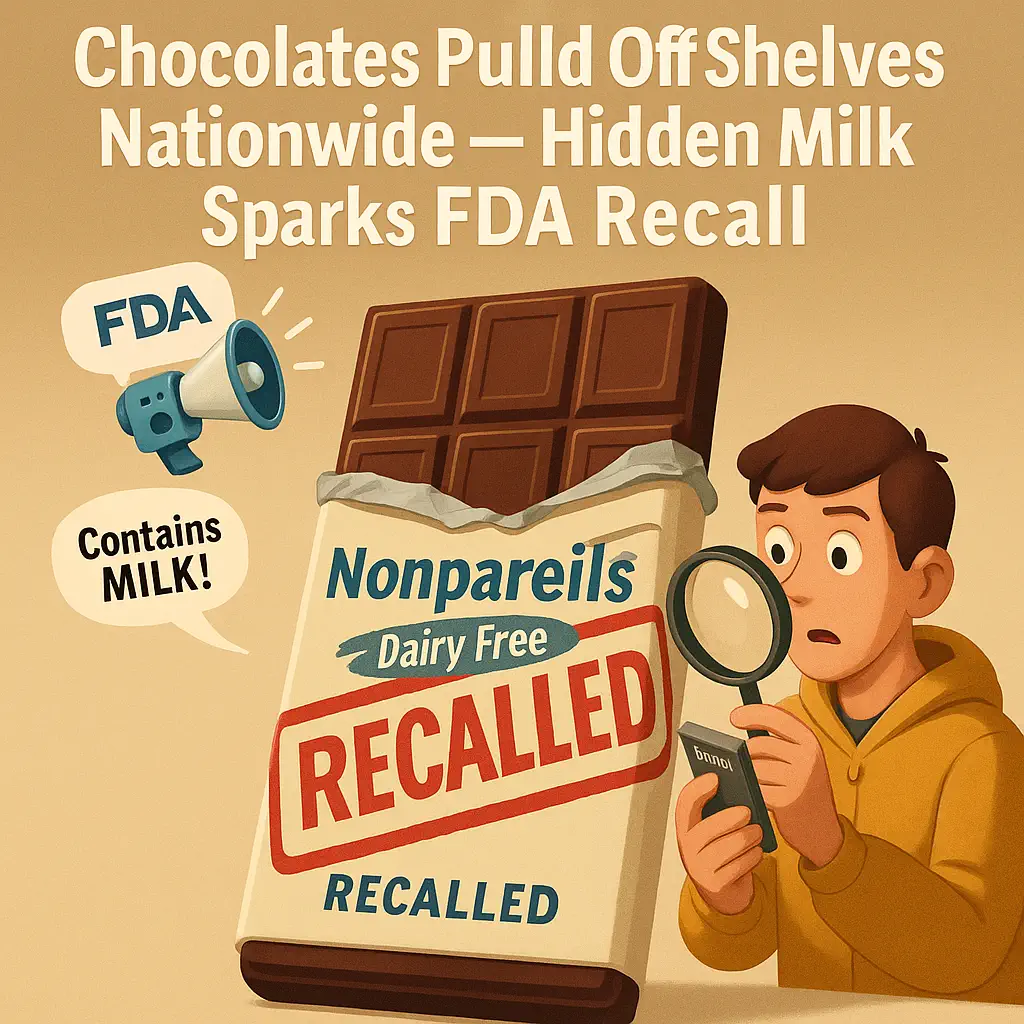If you thought your “dairy-free” chocolates were your one reliable, comforting constant in a chaotic world, we have news that might melt your heart and not in a good way.
In an announcement that has both the food safety community and the lactose-intolerant population in a tizzy, the U.S. Food and Drug Administration (FDA) has issued an urgent recall of select chocolate products being sold across the country. The reason? Milk. Hidden milk. In chocolate products explicitly labelled as “dairy-free.”

Yes, the betrayal is real. Your midnight snack may have had more in common with a glass of warm cow juice than your almond milk latte.
What Happened to Chocolates in the US?
The culprit at the centre of this bittersweet mess is Weaver Nut Company, Inc., a Pennsylvania-based confectionery manufacturer. The company issued a voluntary recall of its Dark Chocolates Nonpareils after it was discovered that the product contains undeclared milk.
The recall was first posted publicly through the FDA’s recall alert system and later reported by news outlets such as Livemint.
The issue lies not in the presence of milk itself (after all, most chocolates do contain it) but in the fact that the product was labelled dairy-free and was marketed toward individuals with dietary restrictions, including those who are allergic to milk or vegan.
Which Products Were Recalled by the US FDA?
Here are the details consumers need to know:
- Product Name: Dark Chocolates Nonpareils
- Brand: Weaver Nut Company, Inc.
- Packaging: 1 lb. clear plastic tub
- UPC Code: 0 20406 75004 6
- Best Before Date: 01/26
- Lot Codes: 423-162 and 423-166
These products were distributed nationwide through both online and retail channels, which means the risk is widespread.
Why This Matters – The Allergy Factor
This isn’t a case of a minor mislabeling or a technical packaging flaw. For individuals with milk allergies, consuming such a product could result in serious or potentially life-threatening allergic reactions, including hives, digestive distress, respiratory issues, and even anaphylaxis.
For others, like those with lactose intolerance or individuals adhering to strict vegan diets, this recall is an unwelcome reminder that food labeling isn’t always as trustworthy as it seems.
The Bigger Picture: How Did This Happen?
According to standard food safety practices, all allergens—particularly the top nine (milk, eggs, fish, shellfish, tree nuts, peanuts, wheat, soybeans, and sesame)—must be declared clearly on packaging.
So how did dairy manage to sneak into a “dairy-free” chocolates?
There are a few possible explanations:
- Cross-contamination during manufacturing
- Errors in ingredient sourcing
- Failure in quality control or labeling oversight
Whatever the cause, the consequences are serious. While Weaver Nut has acted swiftly with the recall, the fact remains: someone, somewhere trusted a label that didn’t deliver. Kind of like those online bios that say “chill and drama-free” and then ghost you by Thursday.
What Should Consumers Do With The Chocolates?
If you’ve recently purchased Dark Chocolates Nonpareils from Weaver Nut or any distributor, here’s what you need to do:
- Check the Lot Codes: Look for 423-162 or 423-166.
- Check the UPC: Make sure it matches 0 20406 75004 6.
- Don’t Eat It: If it matches, put it down. Step away from the snack.
- Return or Dispose: Most stores will allow a return for a full refund, or you can dispose of the product safely.
No illnesses have been reported so far, but the FDA’s quick action is meant to prevent that from happening.
Are Other Products or Brands Affected?
At the moment, only Weaver Nut Company, Inc. is involved in this recall. However, the FDA advises all consumers to check any product labelled “dairy-free” with heightened scrutiny, especially if they rely on such labels for health or religious reasons.
In the complex world of food distribution and repackaging, products sometimes appear under different private labels or bulk bins. So, when in doubt, check the ingredient list twice. And maybe a third time if it says “surprisingly creamy.”
Labels vs Reality: The Satirical Spoonful
There’s something inherently tragicomic about this recall. After all, aren’t chocolates the one thing we turn to when the world gets too loud? A moment of sweetness in a bitter timeline?
To find out it was lying the whole time? That’s betrayal. Real, melted betrayal.
It’s not just about allergens. It’s about trust. When a chocolates bar labelled “dairy-free” contains milk, it’s like discovering your therapist live-tweets your breakdown. It stings.
Consumers are already overwhelmed with buzzwords: gluten-free, vegan, paleo, clean label, cruelty-free, plant-based. And now, apparently, we need a tag for “fact-checked food.” Because clearly, even snack aisles need independent journalism.
Final Thoughts
This incident is more than just a recall; it’s a cautionary tale. It tells us that in a world where branding sells more than content, being an informed, skeptical, slightly paranoid consumer might be your best defence.
To those who rely on honest food labels for health, faith, or lifestyle: this one’s for you. We see you. And more importantly, we’ll keep seeing you—because we’ll be watching those ingredient labels like a hawk.
Meanwhile you stay tuned with The Peak View Stories as we continue to monitor FDA alerts and update this story if other brands or products are added to the recall list. Because apparently, your snack shelf now needs more regulation than your social media.
Disclaimer: This article is based on verified FDA alerts and reporting from trusted media sources like Livemint. No chocolates were harmed during the writing of this story, but many hearts were. Especially those who believed in dairy-free love.